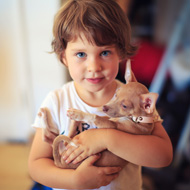Children 'unaware of the danger of scared dogs'

"Young children are relatively good at accurately identifying the emotion that a dog is displaying. However, children's understanding of safe practices around dogs are lacking."
A new study suggests children understand the risks of approaching an angry dog but do not extend the same caution to frightened dogs.
Psychologists from Staffordshire University presented their findings at the annual conference of the British Psychological Society's developmental psychology section.
Two groups of children aged four to five (57) and six to seven years old (61) watched 15 videos and 15 images showing dog behaviour.
The groups were then asked whether they would play with the dog in the video/image and what emotion they thought the dog was feeling.
Dr Sarah Rose explained: "UK statistics show that young children are at the highest risk of being bitten by a dog with nearly 1,200 admissions to hospital for under 10s during 2013-14.
"This study explored whether the explanation is that they are unable to accurately recognise a dog's emotions when approaching one."
The team found children were able to recognise happy, frightened and particularly angry dogs. While they were less likely to approach an angry dog, there was no difference in their inclination to approach a frightened dog.
Dr Rose added: "Young children are relatively good at accurately identifying the emotion that a dog is displaying.
"However, children's understanding of safe practices around dogs are lacking as they only demonstrated caution about approaching angry dogs. They appeared to be unaware that there might be problems approaching frightened dogs. This finding should help inform dog bite prevention campaigns."



 The latest
The latest